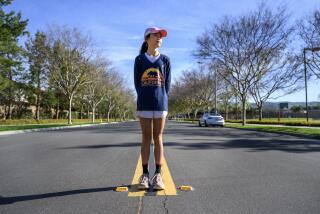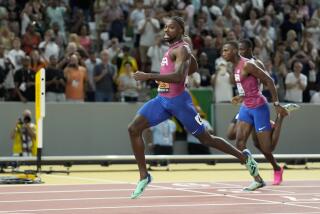Record Times Won’t Count in Boston, N.Y. Marathons : Running: Race organizers protest the TAC ruling, saying Boston, at least, should be exempt.
- Share via
BOSTON — Best times established in the Boston and New York marathons won’t count as records, according to a ruling by The Athletics Congress, the governing body of track in the United States.
At its convention last month, TAC delegates approved a rule governing the general makeup of a marathon course, which discredited both courses, and made the ruling retroactive. The Boston Marathon has been run 93 times.
The action reportedly was taken to bring TAC into line with an expected similar rule change by the International Amateur Athletic Federation, the governing body of track worldwide.
The Athletic Congress-approved rules call for loop marathon courses, with the start and finish not farther apart than 30% of the distance of the race. They also ban downhill courses that drop more than one meter per kilometer.
The Boston course meets neither requirement, and the New York course doesn’t satisfy the loop requirement.
“The men’s long-distance committee was unanimous that Boston be exempted from the legislation, but that wasn’t the version that went before the entire convention,” John McGrath, a Boston TAC official, said.
“The IAAF almost surely would have gone along with an exemption for Boston,” he told the Boston Globe. “The point of the rule is to have control over downhill courses set up solely for setting records.”
Three bests have been set on the Boston course: Yun Bok Suh’s time of 2 hours, 25 minutes, 39 seconds in 1947, Liane Winter’s 2:42:24 in 1975 and Joan Benoit’s 2:22:43 in 1983.
“Boston is not in any way set up as a downhill record-setting course,” said Guy Morse, race director for the Boston Athletic Assn. “The history of this course should be recognized and this race grandfathered.”
“It’s absurd,” said Fred Lebow, director of the New York Marathon. “You look at the original Greek marathon, the original Olympic marathon course in London, Boston, the longest continuously run marathon, and New York, the biggest marathon, and what do you see? They’re all point-to-point.”
“I’ve run Boston 13 times, and this course beats you up,” said Bill Rodgers. “For the number of world-class athletes who have run here, there aren’t that many fast times. It’s not some pancake course.”
“It’s a tough course,” Benoit said. “On paper it seems to be easy, but it’s a course that takes a lot out of you. I wouldn’t tell anyone to run Boston if they were looking for a record.”
More to Read
Go beyond the scoreboard
Get the latest on L.A.'s teams in the daily Sports Report newsletter.
You may occasionally receive promotional content from the Los Angeles Times.






